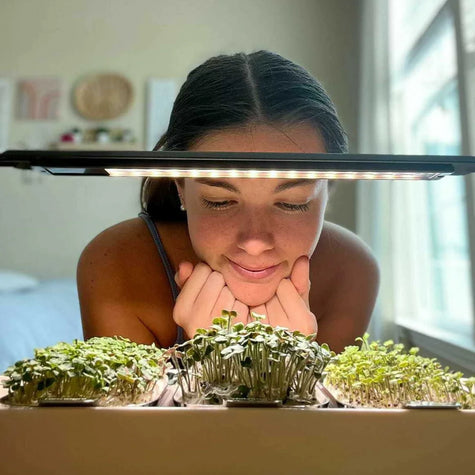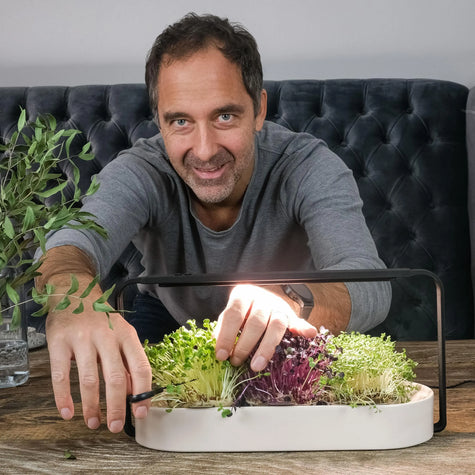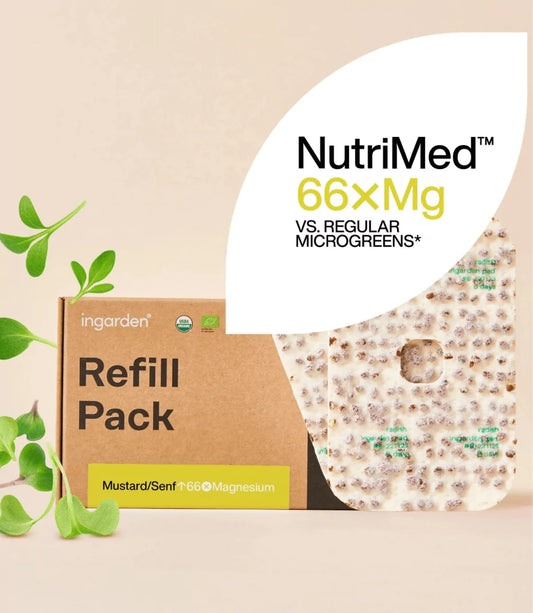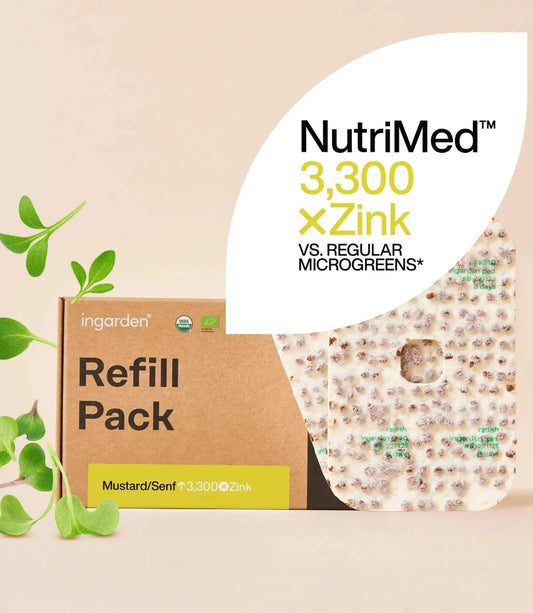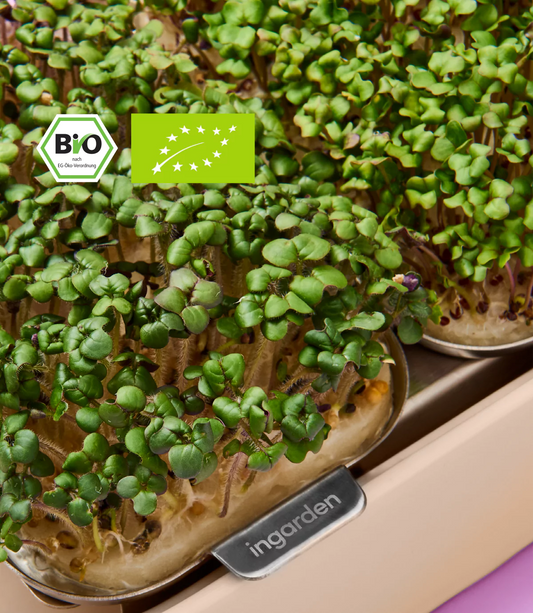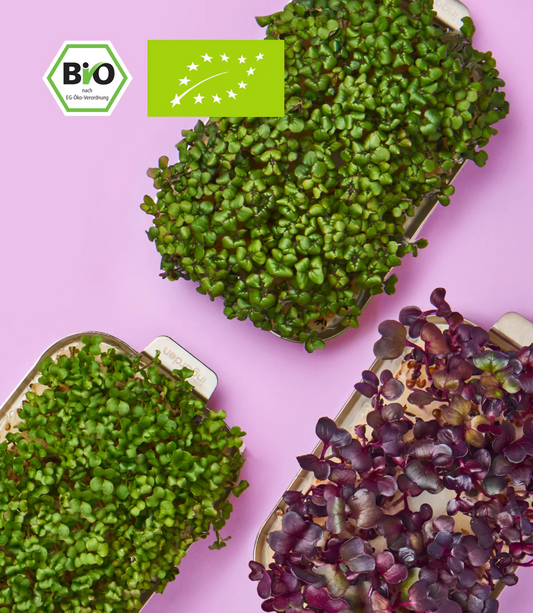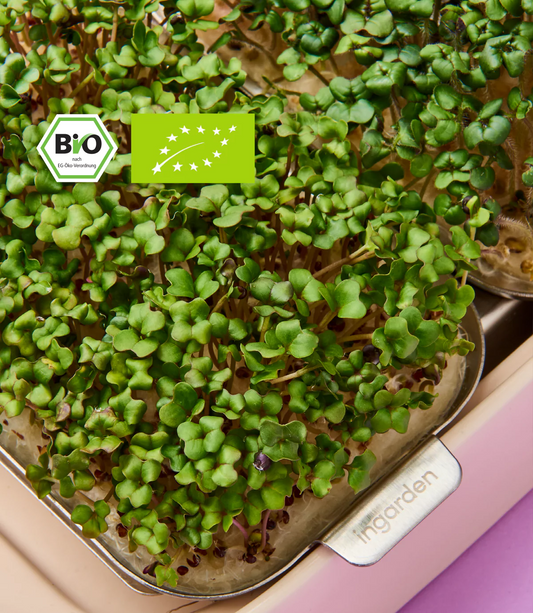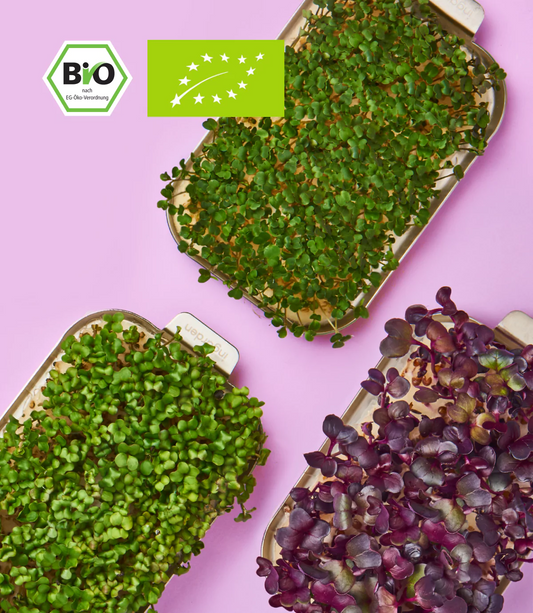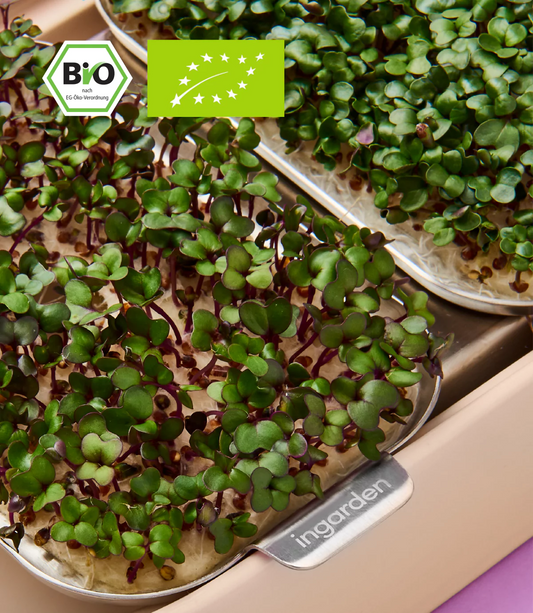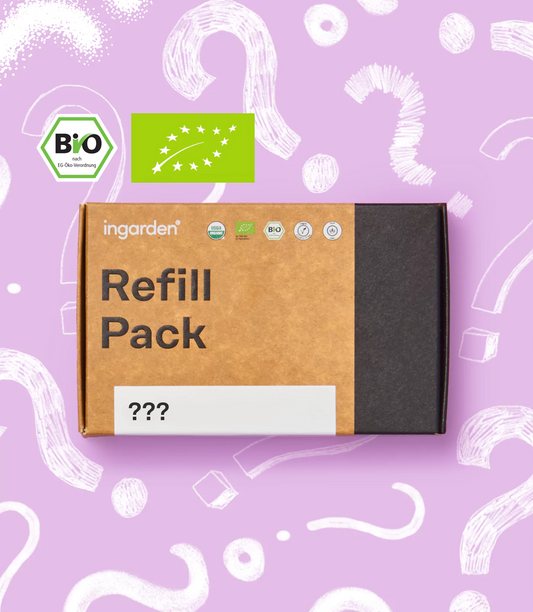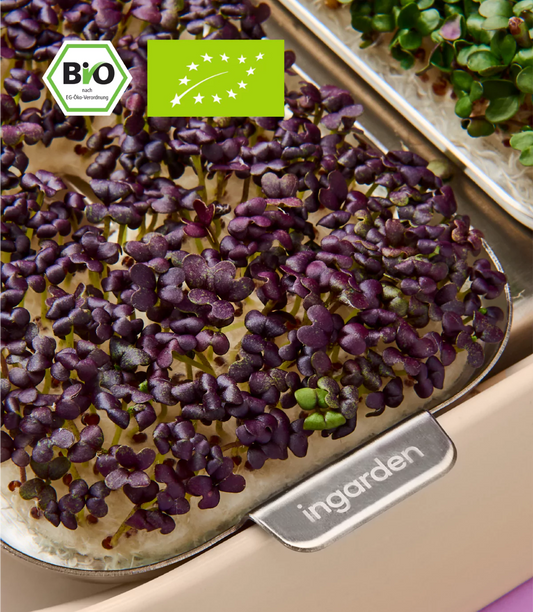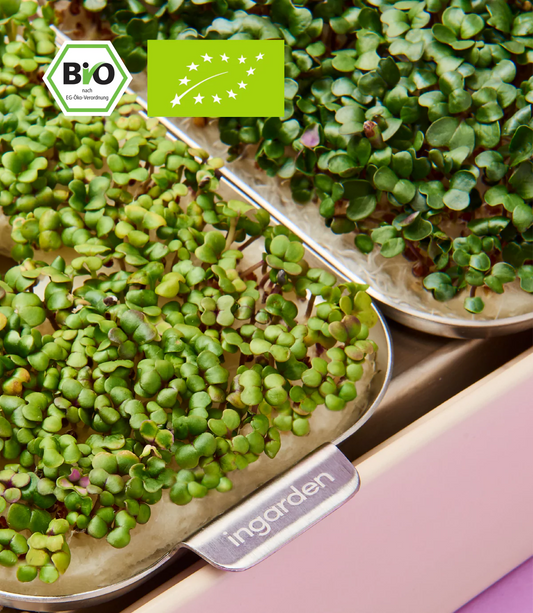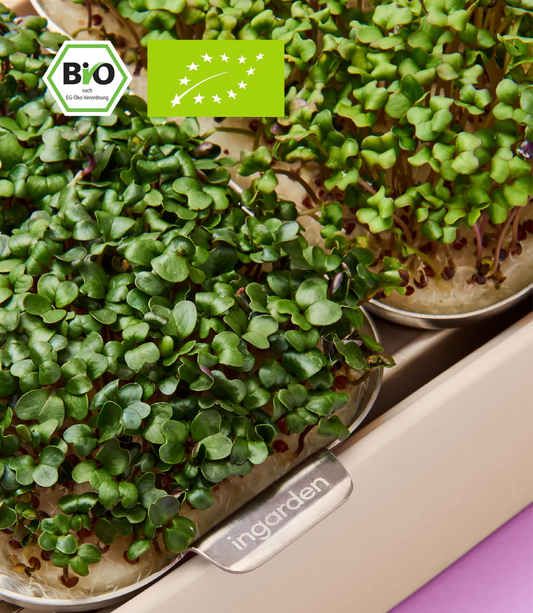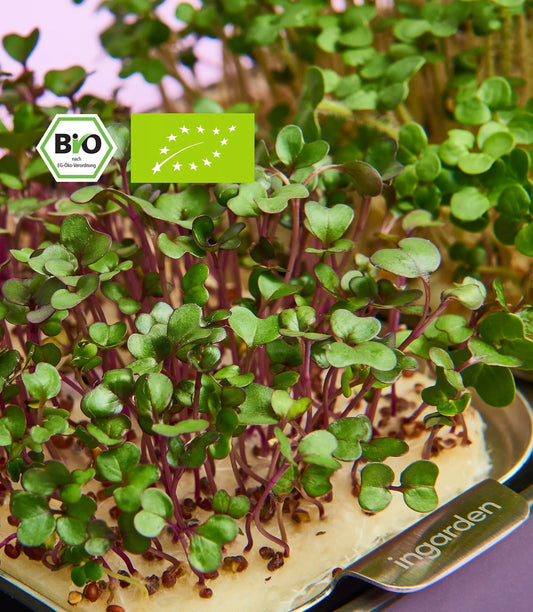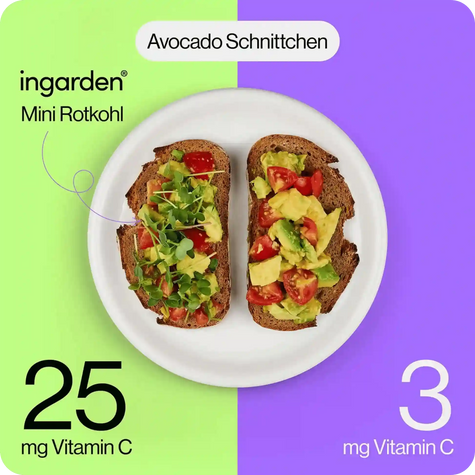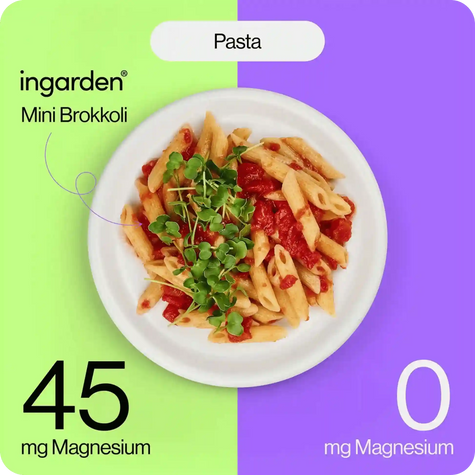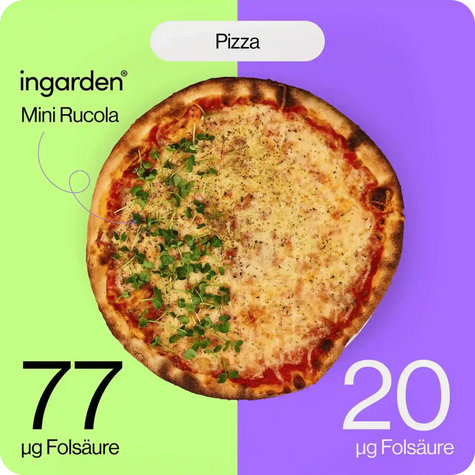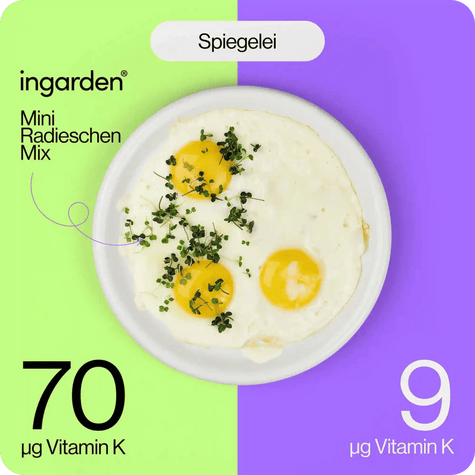-
NutriMed™ Organic Mini Mustard Mg+
Sleep + Nervous System | Rich in Magnesium (81 mg/100 g) | 6 Organic Seed Pads | +66% Mg vs. conventional microgreens – €26,85 -
NutriMed™ Organic Mini Mustard Zn+
Immune system | Super high in zinc (27 mg/100 g) | 6 organic seed pads | +3,300% Zn vs. conventional microgreens – €26,85 -
Organic mini arugula
Energy + Nervous System | Iron Source (2.2 mg/100 g) | 6 Organic Seed Pads – €17,90 -
Organic Mini Mustard
Hair + Skin | Source of Vitamin B8 (7.24 μg/100 g) | 6 Organic Seed Pads – €17,90 -
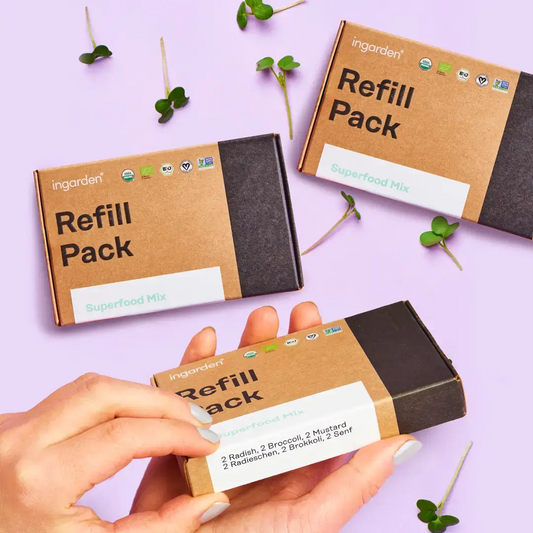
-
Organic superfood mix
2x organic seed pads radish mix, 2x organic seed pads broccoli & 2x organic seed pads mustard – €17,90 -
Organic mini broccoli
Immune system + cell protection | Vitamin C (24.1 mg/100 g) & Sulforaphane source | 6 organic seed pads – €17,90 -
Organic Antioxidant Mix
2x organic radish volcano seed pads, 2x organic rocket seed pads & 2x organic broccoli seed pads – €17,90 -
Organic Mini Radish Mix
Immune system + energy | Rich in vitamin K1 (61.4 μg/100 g) | 6 organic seed pads – €17,90 -
Organic Mini Radishes "Volcano"
Bones + Skin | Rich in Vitamin K1 (61.4 μg/100 g) | 6 Organic Seed Pads – €17,90 -
Organic mini red cabbage
Bones + Teeth | Calcium Source (120 mg/100 g) | 6 Organic Seed Pads – €17,90 -
Bio-Mystery Superfood Pack
Let yourself be surprised with a refill from our range – €14,91 -
Japanese organic mini leaf mustard "Mizuna"
immune system | Rich in vitamin C (38.7 mg/100 g) | 6 organic seed pads – €17,90 -
Organic Mini Pak Choi
Hair + Skin – €17,90 -
Organic baby kale
Stress + Energy | Rich in manganese (0.6 mg/100 g) | 6 organic seed pads – €17,90 -
Bio-Vitality-Mix
2x organic red cabbage seed pads, 2x organic kale seed pads & 2x organic mustard seed pads – €17,90 -
Organic Mini Radishes China Rose Silk
Immune system + energy metabolism – €17,90
-
Best Seller – Set of 5
1x Organic Radish Mix, 1x Organic Arugula, 1x Organic Mustard, 1x Organic Kale, 1x Organic Superfood Mix | 30 Organic Seed PadsAb €89,50 €79,50 -€10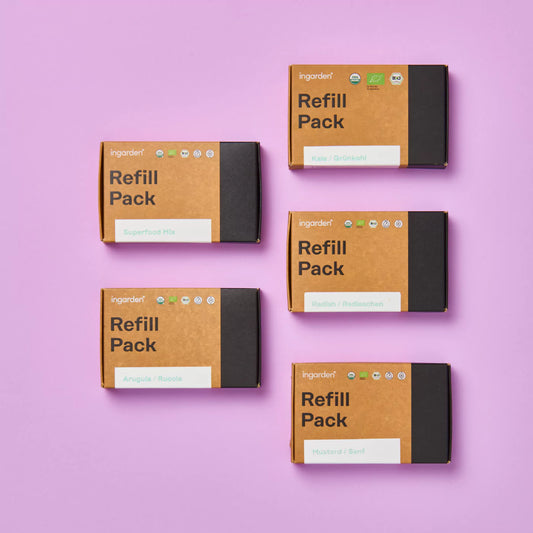
-
Best Seller – Set of 4
1x organic radish mix, 1x organic rocket, 1x organic mustard, 1x organic superfood mix | 24 organic seed padsAb €71,60 €63,83 -€7,77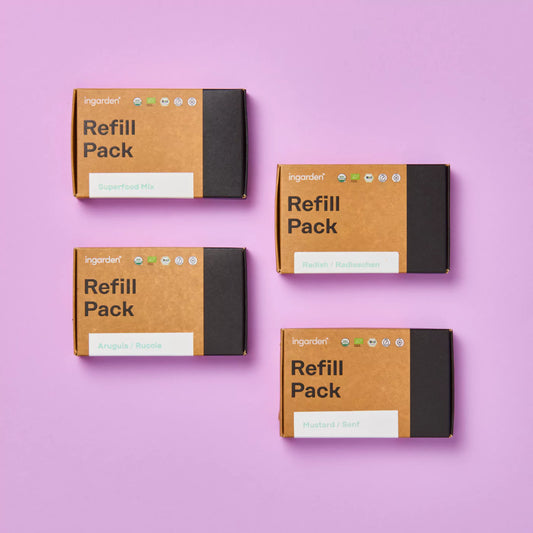
-
Immune Boost – Set of 3
1x organic radish mix, 1x organic broccoli, 1x organic superfood mix | 18 organic seed padsAb €53,70 €48,16 -€5,54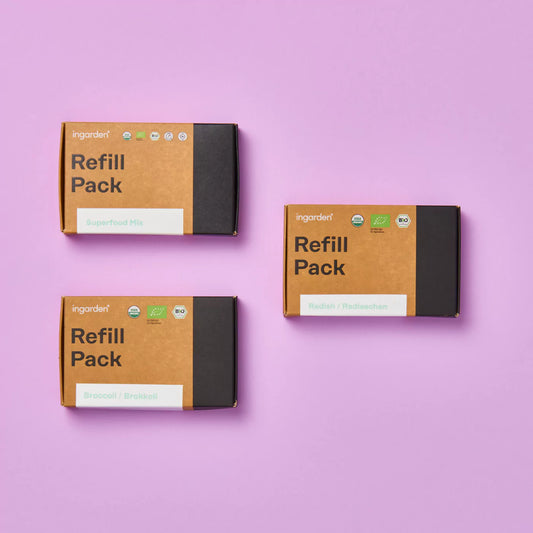
-
Energy Green – Set of 3
1x organic rocket, 1x organic pak choi, 1x organic antioxidant mix | 18 organic seed padsAb €53,70 €48,16 -€5,54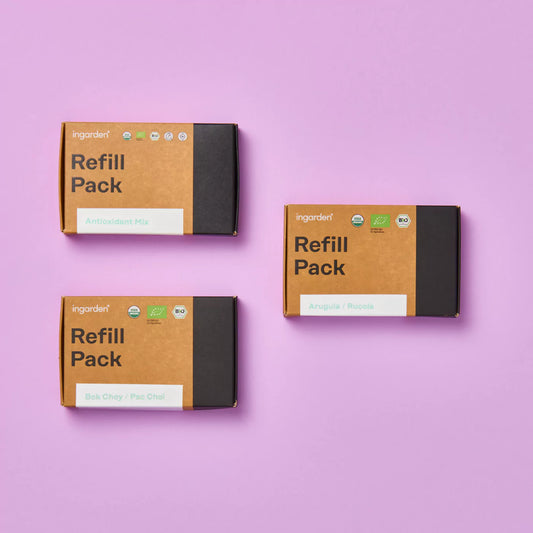
-
Beauty Mix trial pack - 3 pads
1x organic mustard, 1x red cabbage, 1x organic arugula – €5,99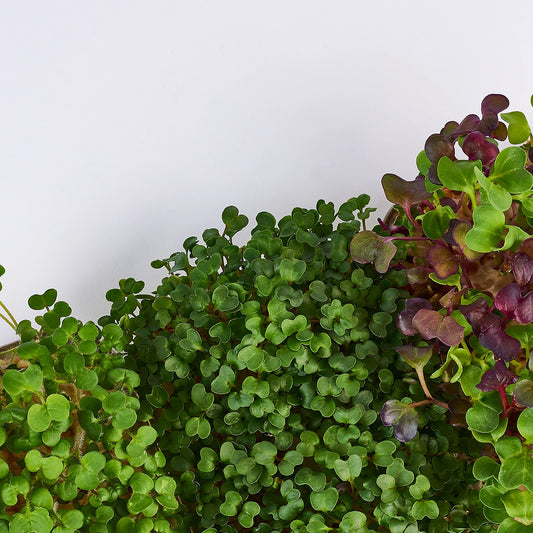
-
Energy Green Mix trial pack - 3 pads
1x organic radish mix, 1x organic mustard, 1x organic arugula – €5,99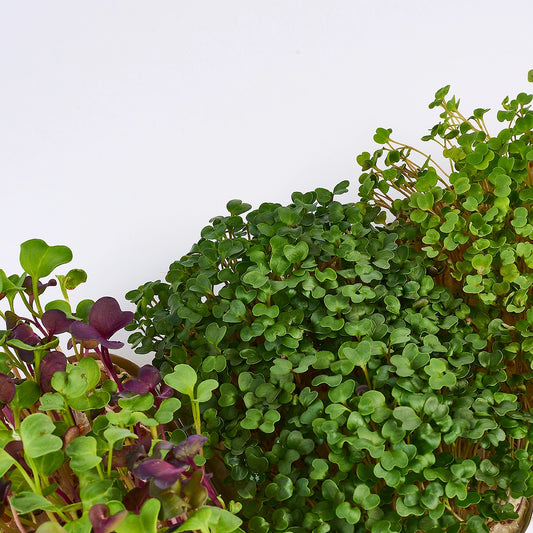
-
Balance Mix trial pack - 3 pads
2x organic mustard, 1x organic red cabbage – €5,99
-
Radish Mix Sample Pack - 3 Pads
3x Organic Radish Mix – €5,99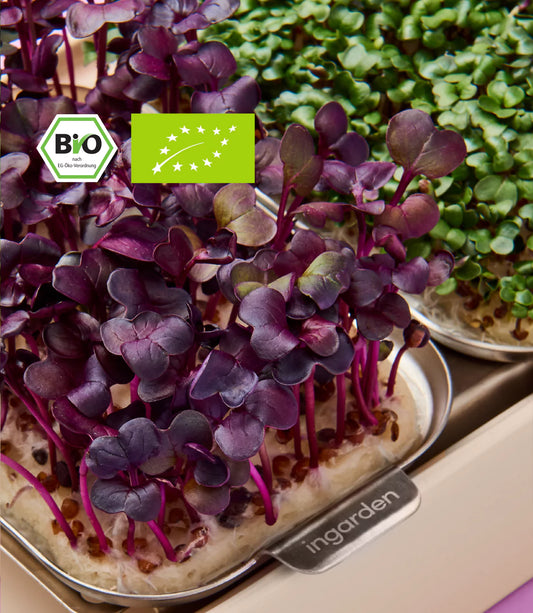
-
Arugula Sample Pack - 3 Pads
3x Organic Arugula – €5,99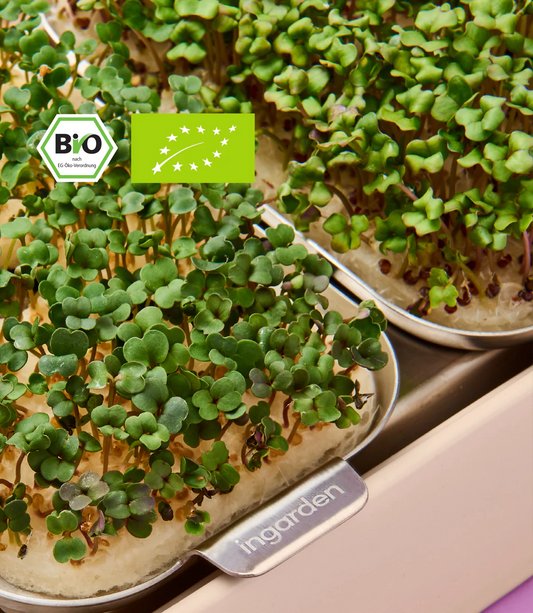
-
Harvesting shears
Perfect for harvesting your microgreens – made of stainless steel with a curved handle – €19,99
-
Fresh Box
Keeps your microgreens fresher for longer – made of stainless steel & bamboo – €17,99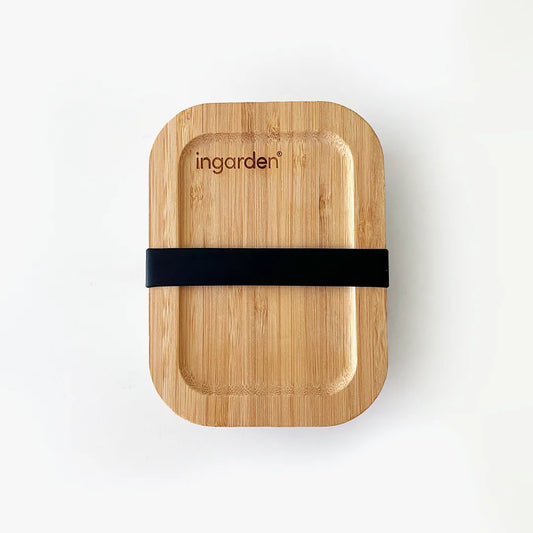
-
Microgreens Recipes eBook
Healthy, delicious recipes with microgreens – €4,99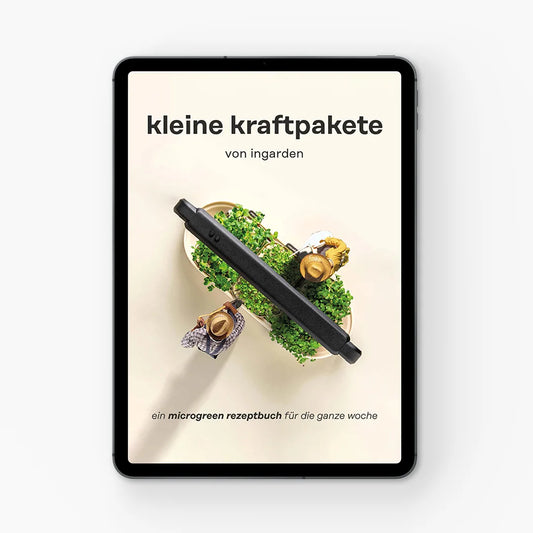
-
Growth discs
Regulates humidity in dry or high air temperatures. – €14,99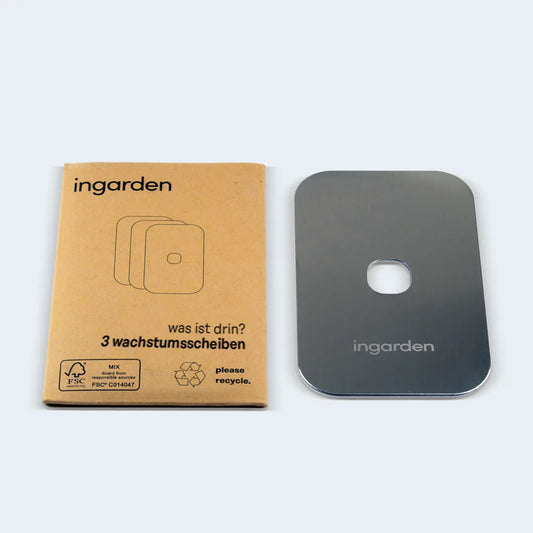
-
wicks
6 wicks (replacement recommended after 3-4 months of regular cultivation). – €4,99
-
ingarden bowl – replacement part
Replacement part: ingarden bowl available in various colors – €39,00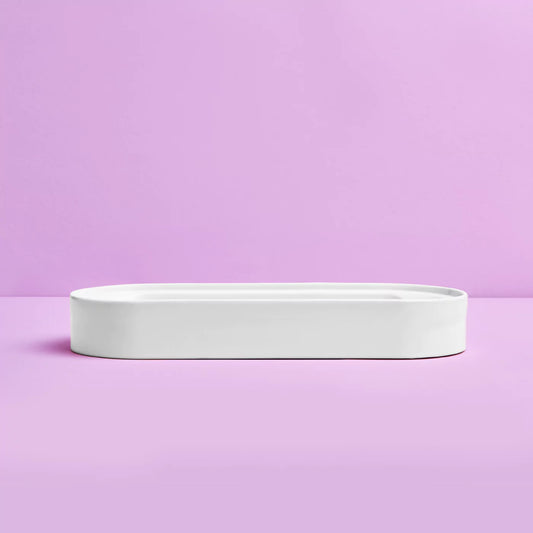
-
Power supply – spare part
Spare part: Power supply for the ingarden LED frame – €10,99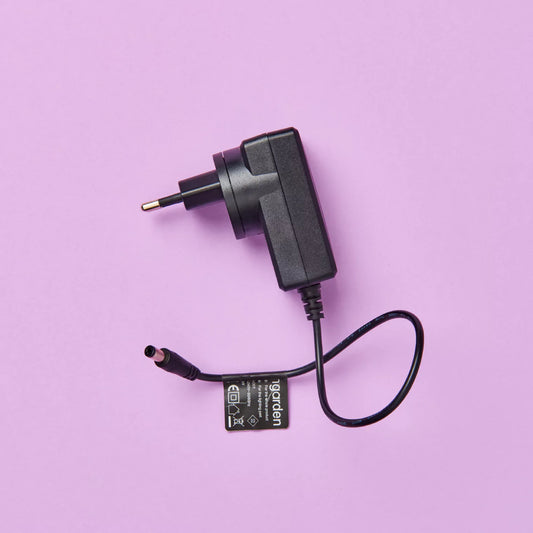
-
1x Wick holder – spare part
Spare part: A wick holder for the ingarden Microgreen growing kit – €5,00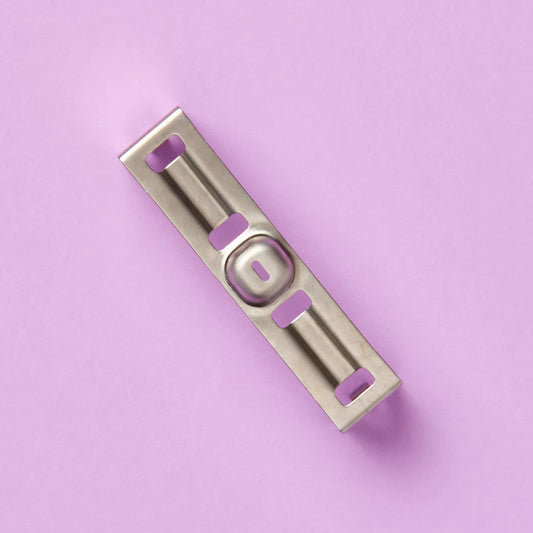
-
ingarden gift card
Are you looking for the perfect, innovative gift, but unsure which ingarden color or superfood the lucky recipient would like? Then simply give the ingarden gift card. – €25,00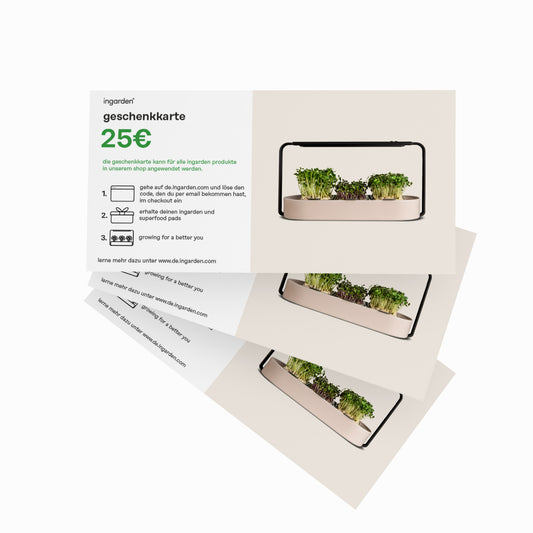
Creating healthier things – on our plates and in our habits.
These nutrients can be found in our varieties – clinically tested.
View nutrient table| Empfohlene Tagesdosis | arugula | |
|---|---|---|
| Vitamin E | 12 mg | 0.33 mg (2.8%) |
| Vitamin K | 75 μg | 17.2 μg (22.9%) |
| Vitamin C | 80 mg | 11 mg (13.8%) |
| Vitamin B1 (Thiamine) | 1.1 mg | 0.06 mg (5.5%) |
| Vitamin B2 (Riboflavin) | 1.4 μg | 0.09 μg (6.4%) |
| Vitamin B3 (Niacin) | 16 mg | 0.03 mg (0.2%) |
| Vitamin B6 | 1.4 mg | 0.14 mg (10%) |
| Folic acid | 200 μg | 57.4 μg (28.7%) |
| Biotin | 50 μg | 5.15 μg (10.3%) |
| potassium | 2000 mg | 360 mg (18%) |
| calcium | 800 mg | 42 mg (5.3%) |
| phosphorus | 700 mg | 53 mg (7.6%) |
| magnesium | 375 mg | 33 mg (8.8%) |
| iron | 14 mg | 2.2 mg (15.7%) |
| zinc | 10 mg | 0.8 mg (8%) |
| copper | 1 mg | 0.07 mg (7%) |
| manganese | 2 mg | 0.74 mg (37%) |
Key findings
Compared to 100g of raw supermarket arugula*, 100g of organic arugula microgreens from ingarden contain:
- 57% more iron
- 56% more manganese
- 51% more folic acid
- 24% more lutein
- 13% more choline
* Source
* Source
The nutritional values of our microgreens may vary as they are a natural product.
| Empfohlene Tagesdosis | broccoli | |
|---|---|---|
| Vitamin E | 12 mg | 0.25 mg (2.1%) |
| Vitamin K | 75 μg | 36.5 μg (48.7%) |
| Vitamin C | 80 mg | 24.1 mg (30.1%) |
| Vitamin B1 (Thiamine) | 1.1 mg | 0.05 mg (4.5%) |
| Vitamin B2 (Riboflavin) | 1.4 μg | 0.07 μg (5.0%) |
| Vitamin B3 (Niacin) | 16 mg | 0.7 mg (4.4%) |
| Vitamin B6 | 1.4 mg | 0.13 mg (9.3%) |
| Folic acid | 200 μg | 33.1 μg (16.6%) |
| Biotin | 50 μg | 2.62 μg (5.2%) |
| potassium | 2000 mg | 250 mg (12.5%) |
| calcium | 800 mg | 65 mg (8.1%) |
| phosphorus | 700 mg | 73 mg (10.4%) |
| magnesium | 375 mg | 45 mg (12%) |
| iron | 14 mg | 0.73 mg (5.2%) |
| zinc | 10 mg | 0.4 mg (4%) |
| copper | 1 mg | 0.05 mg (5%) |
| manganese | 2 mg | 0.7 mg (35%) |
Key findings
Compared to 100g of raw supermarket broccoli*, 100g of organic broccoli microgreens from ingarden contain:
- 424% more biotin
- 169% more manganese
- 150% more magnesium
- 12% more calcium
- 4% more lutein
* Source
* Source
The nutritional values of our microgreens may vary as they are a natural product.
| Empfohlene Tagesdosis | Kale | |
|---|---|---|
| Vitamin E | 12 mg | 0.08 mg (0.7%) |
| Vitamin K | 75 μg | 9.11 μg (12.1%) |
| Vitamin C | 80 mg | 15.3 mg (19.1%) |
| Vitamin B1 (Thiamine) | 1.1 mg | 0.05 mg (4.5%) |
| Vitamin B2 (Riboflavin) | 1.4 μg | 0.04 μg (2.9%) |
| Vitamin B3 (Niacin) | 16 mg | 0.5 mg (3.1%) |
| Vitamin B6 | 1.4 mg | 0.1 mg (7.1%) |
| Folic acid | 200 μg | 33.8 μg (16.9%) |
| Biotin | 50 μg | 1.89 μg (3.8%) |
| potassium | 2000 mg | 250 mg (12.5%) |
| calcium | 800 mg | 36 mg (4.5%) |
| phosphorus | 700 mg | 39 mg (5.6%) |
| magnesium | 375 mg | 23 mg (6.1%) |
| iron | 14 mg | 0.51 mg (3.6%) |
| zinc | 10 mg | 0.5 mg (5%) |
| copper | 1 mg | 0.04 mg (4%) |
| manganese | 2 mg | 0.6 mg (30%) |
Key findings
Compared to 100g of raw supermarket kale*, 100g of organic kale microgreens from ingarden contain:
- 2213% more choline
- 89% more biotin
- 9% more manganese
* Source
* Source
The nutritional values of our microgreens may vary as they are a natural product.
| Empfohlene Tagesdosis | Mustard | |
|---|---|---|
| Vitamin E | 12 mg | 0.204 mg (1.7%) |
| Vitamin K | 75 μg | 11.2 μg (14.9%) |
| Vitamin C | 80 mg | 9.36 mg (11.7%) |
| Vitamin B1 (Thiamine) | 1.1 mg | 0.04 mg (3.6%) |
| Vitamin B2 (Riboflavin) | 1.4 μg | 0.07 μg (5%) |
| Vitamin B3 (Niacin) | 16 mg | 0.1 mg (0.6%) |
| Vitamin B6 | 1.4 mg | 0.1 mg (7.1%) |
| Folic acid | 200 μg | 33.1 μg (16.6%) |
| Biotin | 50 μg | 7.24 μg (14.5%) |
| potassium | 2000 mg | 240 mg (12%) |
| calcium | 800 mg | 38 mg (4.8%) |
| phosphorus | 700 mg | 58 mg (8.3%) |
| magnesium | 375 mg | 31 mg (8.3%) |
| iron | 14 mg | 0.95 mg (6.8%) |
| zinc | 10 mg | 0.81 mg (8.1%) |
| copper | 1 mg | 0.08 mg (8%) |
| manganese | 2 mg | 0.44 mg (22%) |
Key findings
Compared to 100g of processed yellow mustard*, 100g of organic mustard microgreens from ingarden contain:
- 30-20% more Vitamin C
- 708% more lutein
- 700% more vitamin K1
- 373% more folic acid
- 171% more choline
- 45% more biotin
* Source
The nutritional values of our microgreens may vary as they are a natural product.
| Empfohlene Tagesdosis | radish | |
|---|---|---|
| Vitamin E | 12 mg | 0.58 mg (4.8%) |
| Vitamin K | 75 μg | 61.4 μg (81.9%) |
| Vitamin C | 80 mg | 14.6 mg (18.3%) |
| Vitamin B1 (Thiamine) | 1.1 mg | 0.08 mg (7.3%) |
| Vitamin B2 (Riboflavin) | 1.4 μg | 0.06 μg (4.3%) |
| Vitamin B3 (Niacin) | 16 mg | 0.5 mg (3.1%) |
| Vitamin B6 | 1.4 mg | 0.16 mg (11.4%) |
| Folic acid | 200 μg | 39.6 μg (19.8%) |
| Biotin | 50 μg | 2.88 μg (5.8%) |
| potassium | 2000 mg | 220 mg (11%) |
| calcium | 800 mg | 32 mg (4%) |
| phosphorus | 700 mg | 51 mg (7.3%) |
| magnesium | 375 mg | 33 mg (8.8%) |
| iron | 14 mg | 0.48 mg (3.4%) |
| zinc | 10 mg | 0.4 mg (4%) |
| copper | 1 mg | 0.04 mg (4%) |
| manganese | 2 mg | 0.47 mg (23.5%) |
Key findings
Compared to 100g of raw supermarket radish*, 100g of organic radish microgreens from ingarden contain:
- 29900% more lutein
- 5700% more vitamin E
- 4623% more Vitamin K1
- 581% more manganese
- 476% more biotin
- 313% more magnesium
- 222% more choline
- 65% more folic acid
- 20% more iron
* Source
* Source
The nutritional values of our microgreens may vary as they are a natural product.
| Empfohlene Tagesdosis | red cabbage | |
|---|---|---|
| Vitamin E | 12 mg | 1.32 mg (11%) |
| Vitamin K | 75 μg | 15.9 μg (21.2%) |
| Vitamin C | 80 mg | 21.7 mg (27.1%) |
| Vitamin B1 (Thiamine) | 1.1 mg | 0.09 mg (8.2%) |
| Vitamin B2 (Riboflavin) | 1.4 μg | 0.08 μg (5.7%) |
| Vitamin B3 (Niacin) | 16 mg | 0.9 mg (5.6%) |
| Vitamin B6 | 1.4 mg | 0.17 mg (12.1%) |
| Folic acid | 200 μg | 55.8 μg (27.9%) |
| Biotin | 50 μg | 4.79 μg (9.6%) |
| potassium | 2000 mg | 220 mg (11%) |
| calcium | 800 mg | 120 mg (15%) |
| phosphorus | 700 mg | 67 mg (9.6%) |
| magnesium | 375 mg | 38 mg (10.1%) |
| iron | 14 mg | 0.76 mg (5.4%) |
| zinc | 10 mg | 0.7 mg (7%) |
| copper | 1 mg | 0.06 mg (6%) |
| manganese | 2 mg | 0.37 mg (18.5%) |
Key findings
Compared to 100g of raw supermarket red cabbage*, 100g of organic red cabbage microgreens from ingarden contain:
- 270% more manganese
- 243% more calcium
- 211% more choline
- 200% more lutein
- 140% more biotin
- 138% more magnesium
- 59% more folic acid
- 52% more iron
* Source
* Source
The nutritional values of our microgreens may vary as they are a natural product.
| Empfohlene Tagesdosis | Pak Choi | |
|---|---|---|
| Vitamin E | 12 mg | - |
| Vitamin K | 75 μg | - |
| Vitamin C | 80 mg | - |
| Vitamin B1 (Thiamine) | 1.1 mg | - |
| Vitamin B2 (Riboflavin) | 1.4 μg | - |
| Vitamin B3 (Niacin) | 16 mg | - |
| Vitamin B6 | 1.4 mg | - |
| Folic acid | 200 μg | - |
| Biotin | 50 μg | - |
| potassium | 2000 mg | 284 mg (14.2%) |
| calcium | 800 mg | 58 mg (7.3%) |
| phosphorus | 700 mg | 59 mg (8.4%) |
| magnesium | 375 mg | 31 mg (8.3%) |
| iron | 14 mg | 0.49 mg (3.5%) |
| zinc | 10 mg | 0.3 mg (3%) |
| copper | 1 mg | 0.05 mg (5%) |
| manganese | 2 mg | 0.29 mg (14.5%) |
| Empfohlene Tagesdosis | Mizuna mustard | |
|---|---|---|
| Vitamin E | 12 mg | - |
| Vitamin K | 75 μg | - |
| Vitamin C | 80 mg | - |
| Vitamin B1 (Thiamine) | 1.1 mg | - |
| Vitamin B2 (Riboflavin) | 1.4 μg | - |
| Vitamin B3 (Niacin) | 16 mg | - |
| Vitamin B6 | 1.4 mg | - |
| Folic acid | 200 μg | - |
| Biotin | 50 μg | - |
| potassium | 2000 mg | 354 mg (17.7%) |
| calcium | 800 mg | 48 mg (6%) |
| phosphorus | 700 mg | 57 mg (8.1%) |
| magnesium | 375 mg | 29 mg (7.7%) |
| iron | 14 mg | 0.57 mg (4.1%) |
| zinc | 10 mg | 0.28 mg (2.8%) |
| copper | 1 mg | 0.06 mg (6%) |
| manganese | 2 mg | 0.36 mg (18%) |
Over 20,000 kitchens are already green – now it's your turn! 🌱💚
Still questions?
arugula
A source of iron (2.2 mg/100 g), which contributes to energy metabolism and normal cognitive function. 🧠
broccoli
Source of vitamin C (24.1 mg/100 g), which supports the immune system and normal psychological function 🛡️
Kale
Rich in manganese (0.6 mg/100 g), which protects your cells from oxidative stress 💪
Mustard
Source of vitamin B8 (biotin) (7.24 μg/100 g), which contributes to the maintenance of your hair & skin 💅
radish
Rich in vitamin K1 (61.4 μg/100 g), which contributes to the maintenance of your bones and blood clotting 🩸
red cabbage
A source of calcium (120 mg/100 g), which contributes to normal muscle function and supports the maintenance of healthy bones and teeth. 🦷🦴
The seed pads have a shelf life of up to two years. The exact expiration date is indicated on the packaging. Even after this date, the seeds can still be used, however, we can no longer guarantee an optimal germination rate.
Our certified organic seed pads are made in Germany from 100% biodegradable fluff fibers derived from chlorine-free bleached spruce wood. They are fully biodegradable and compostable. The organic seeds come from vetted and trusted farmers in the Netherlands and Italy, both of whom are certified organic and regularly inspected to ensure no additives are used. Our pads are therefore 100% European and undergo regular inspections and audits to guarantee we meet the highest standards.
Absolutely! Ingarden's microgreens are organically grown and free from pesticides, herbicides, and genetic engineering. All our microgreens come exclusively from trusted sources and have a guaranteed germination rate of 95%.
Yes, you're the boss! Cancel after the first delivery or make it a new habit. You can cancel anytime by logging into your account or by contacting us. We'll send you a notification before each delivery, giving you plenty of time to adjust your order. Need help? Just email us at info.de@ingarden.com .
We want to make sure you have as much control as possible over your subscription! Here's what you can do:
- Change the frequency of your broadcasts.
- Postpone the next shipping date of your order to any date of your choice.
- Add or swap flavors and products.
- Add unique products with a special discount ;)
- Change your shipping address, etc.!
All these options can be managed via your account or via email: info.de@ingarden.com .
Does Ingarden reach the cells?
International studies show:
Regular consumption of microgreens significantly increases vitamin levels in the blood. Researchers also confirm that microgreens have a high bioavailability of bioactive compounds, antioxidant plant substances, and minerals.²
1. Harty et al. (2023). Environmental factors influencing the growth and pathogenicity of microgreens bound for the market: A review
2. De la Fuente et al. (2019). Evaluation of the Bioaccessibility of Antioxidant Bioactive Compounds and Minerals of Four Genotypes of Brassicaceae Microgreens
3. Weber, CF (2017). Broccoli microgreens: a mineral-rich crop that can diversify food systems. Frontiers in Nutrition , 4, 7.
4. Xiao, Z., Lester, GE, Luo, Y., & Wang, Q. (2012). Assessment of vitamin and carotenoid concentrations of emerging food products: Edible microgreens. Journal of Agricultural and Food Chemistry, 60 (31), 7644–7651
